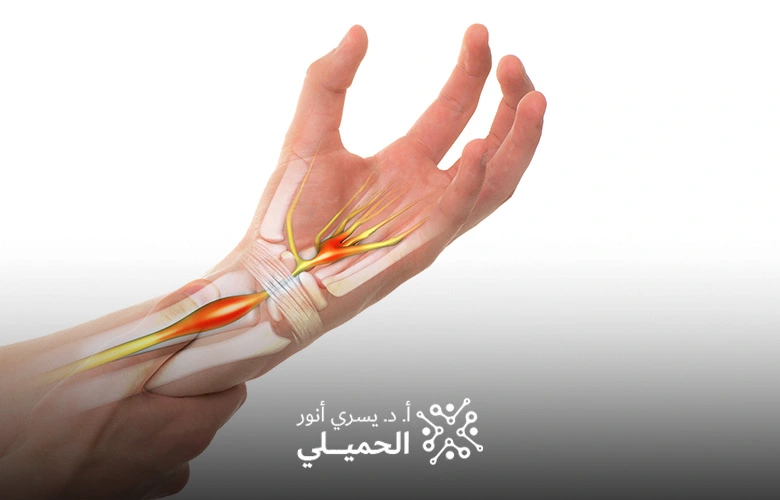Nerve entrapment, or entrapment neuropathy, is a condition where a nerve becomes compressed or trapped between two other structures in the body, typically between ligaments and bones. Repetitive movements can cause the nerve to be pressed or rubbed, leading to damage to the tissue covering the outer part of the nerve, which primarily helps in transmitting nerve signals. When damaged, the nerve’s ability to transmit signals is reduced, causing symptoms such as numbness, tingling, and burning in the fingers or other extremities.
Who Is at Risk for Nerve Entrapment?
Anyone can suffer from nerve entrapment syndrome due to various causes, such as obesity, pregnancy, or the use of splints and crutches. Individuals who engage in activities requiring repetitive motions, such as athletes or workers in fields like construction and carpentry, are also at risk of developing nerve entrapment syndrome.
Conditions Requiring Nerve Decompression Surgeries
Nerve entrapment can be acute or chronic. Acute entrapment neuropathy usually results from an injury, such as a sprain or fracture, causing bones or ligaments to move and compress the nerve.
Chronic entrapment neuropathy is often due to repetitive motion affecting the area where the nerve passes through a narrow space. Surgeons perform nerve decompression surgeries in the following cases:
- Carpal Tunnel Syndrome: Affects the nerve responsible for movement and sensation in the hand and wrist, caused by continuous pressure on the nerve in the wrist area due to repetitive use.
- Sciatic Compression (Sciatica): Commonly caused by a herniated disc, involving tingling, pain, and numbness in the lower back, legs, or feet.
- Ulnar Nerve Entrapment: Compression of the nerve at the elbow or wrist.
- Peroneal Nerve Entrapment: Compression of the nerve in the knee, branching from the sciatic nerve.
Other cases of chronic nerve entrapment neuropathy may also occur, with each requiring different surgical approaches. You can consult with Professor Dr. Yousry Anwar El-Hamili to discuss your symptoms and the best treatment options.
Our Techniques for Diagnosing Nerve Entrapment
Dr. Yousry Anwar El-Hamili conducts various tests during the physical examination to evaluate symptoms. If these tests indicate a potential nerve problem, one or more diagnostic tests may be performed:
- Electromyography (EMG): Measures the transmission of nerve signals to the muscles.
- Imaging Tests (MRI, Musculoskeletal Ultrasound, X-rays): Check for compressed nerves and investigate issues like arthritis, ligament injuries, and fractures.
Nerve Decompression Surgery Procedures
Nerve decompression surgeries relieve pressure on the nerve, including releasing the nerve. For instance, if you have a compressed nerve in the elbow or wrist, like carpal tunnel syndrome, you might experience pain and discomfort day and night. If non-surgical treatments fail, a simple surgery may be needed to relieve the nerve pressure.
During the surgery:
- Identifying the Affected Nerve: Dr. Yousry identifies the compressed nerve and assesses its severity.
- Performing the Surgery: Reducing pressure on the nerve by making small incisions in the surrounding ligaments, providing more space for the nerve.
- Post-Surgery: Pain may persist for a while, and the hand and wrist need time to heal.
- Monitoring Results: Observing symptom improvement post-surgery; some individuals may require more time to recover.
- Additional Treatments: Some patients may need physical therapy sessions or further adjustments.
Benefits of Nerve Decompression Surgeries
Nerve decompression surgeries offer numerous benefits, including:
- Pain relief from nerve compression or friction.
- Restoration of damaged nerve function, aiding in the recovery of normal movement and sensation in affected areas.
- Improved movement and balance, especially in limbs affected by nerve compression.
- Enhanced ability to perform daily activities with greater ease.
- Psychological comfort and reduced stress and anxiety from pain.
- Prevention of worsening nerve compression conditions and reduced risk of future complications.
Best Surgeon for Nerve Decompression Surgeries
Professor Dr. Yousry Anwar El-Hamili stands out in the field of nerve decompression surgeries due to his extensive and in-depth experience:
- Academic and Professional Excellence: Graduated with honors in December 1992, obtained a Master’s in General Surgery in November 1996, and earned a Ph.D. in Neurosurgery and Spine Surgery in November 2000. He has been a professor in the Department of Neurosurgery and Spine Surgery at Cairo University since 2011.
- Diagnostic and Treatment Expertise: Capable of diagnosing and treating complex nerve decompression cases with a deep understanding of the nervous system’s anatomy and functions.
- Advanced Technology and Surgical Techniques: Utilizing cutting-edge technology and modern surgical methods to achieve outstanding results, minimize pain, and reduce complications.
- Effective Communication: Excellent communication skills that help him interact effectively with patients, explaining treatment options clearly, enhancing patient confidence, and improving their treatment experience.
As an expert in his field, Dr. Yousry is an ideal choice if you seek the best care and surgical intervention for nerve decompression. Nerve entrapment should not hinder anyone’s life. Relieve your pain and contact us now.
